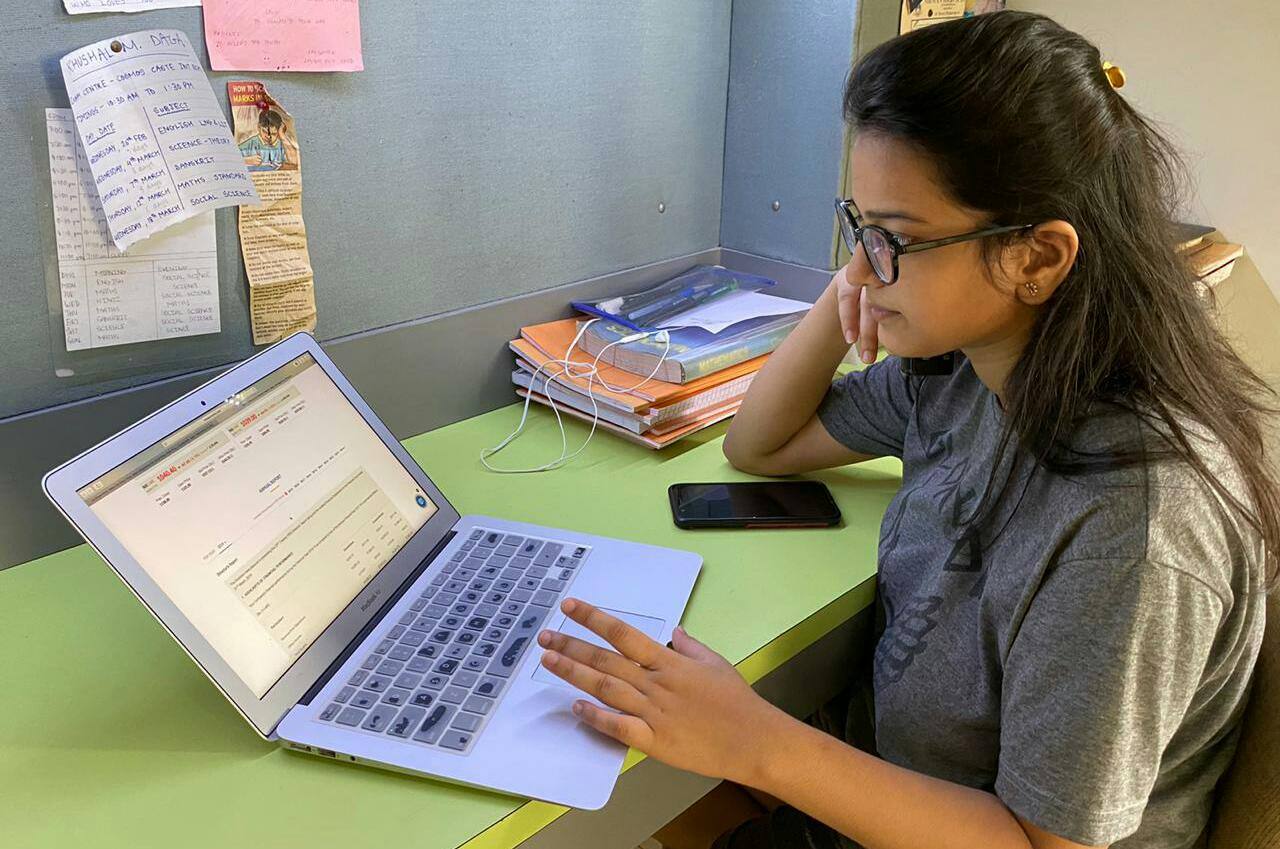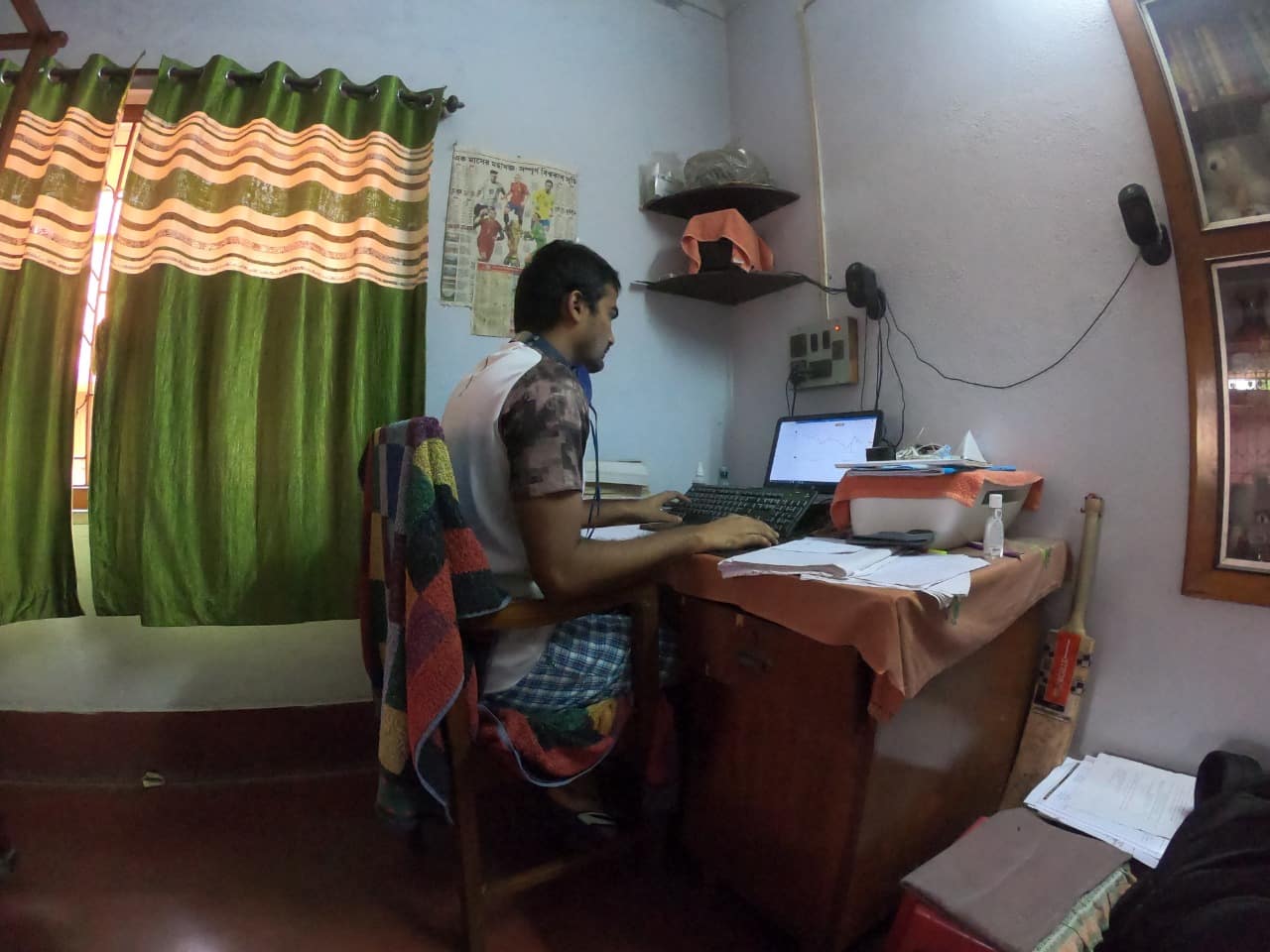



In March, after the coronavirus pandemic began to spread furiously across the globe, Women’s Tennis Association cancelled all international events. Local training facilities downed shutters. Prerna Bhambri, a four-time national tennis champion, was disappointed but didn’t fret.
Bhambri used the free time to take online courses in finance and looked to apply her knowledge to practical use. That’s when she discovered stock investing to be exciting.
“I was never keen on investing in equity as I had an apprehension that it’s akin to gambling,’’ Bhambri said. “During the lockdown, since tennis was off the table for some time, I tried my hand at different things and stock markets caught my fancy."
 Prerna Bhambri, a four-time national tennis champion
Prerna Bhambri, a four-time national tennis champion
Bhambri keeps her trading mantra simple: she researches on companies that she understands. “I don't try to look for complex businesses.”
Around the same time, Mahima Daga, a 22-year law student, also turned to the stock markets to utilise her free time and learn a new skill.
Daga is a regular day trader these days. She regularly faces a dilemma whether to buy or sell the shares when they rally sharply. Now she books some profits in every rally to avoid a big loss.
“It becomes difficult to monitor your portfolio on a daily basis as the market is trading very volatile,” Daga said.
Daga comes from a business and trading family and gets inputs regarding her sectors of interest. “It helps when someone within the family keeps checking the trends of certain shares in my portfolio,’’ she said.
 Mahima Daga, a 22-year law student
Mahima Daga, a 22-year law student
A New Breed Of Investors
Bhambri and Daga are not odd cases. Far from it.
In recent months, retail trading in the stock market has boomed, fuelled by a large number of first-time investors. The four-month lockdown has allowed a range of first-time investors, from professionals to homemakers, who have time to spare to enter the stock market and begin trading of shares. Some enter the markets after having learnt a new skill. Others see stock trading as a way to earn money.
Brokerages have taken aim at these investors by rolling out incentives like commission-free trading, free exchange trade fund (ETF) units and refunds.
They have reported a record number of new accounts and a sharp increase in trading activity.
Pocket money, FDs to stocks
Moneycontrol spoke with five rookie traders about the shares they are investing their money in, the reasons, and the experience so far. The students and young professionals, who have dived into the stock markets, learnt the real-world interplay of fear and greed, and will treasure this as a lifelong learning. Some of the first-timers saw it as an opportunity to earn quick money, some want to keep it as a hobby while the rest may make it a career.
Daga, who lives in Ahmedabad and is studying law, started investing in March with the Rs 10,000 she received from her father. Once she learnt the tricks of the trade, her father gave her more funds and her portfolio increased to Rs 6 lakh.
New Delhi-based Bhambri is the polar opposite of Daga as a trader. She is what one would describe a “very safe investor”. Her investments were centred on fixed deposits because she was reluctant to take risks. Now after investing in shares on her own, true to form, she is treading cautiously.
More and more customers are now looking outside of conventional means of investing money such as fixed deposits, gold etc, according to Jaideep Arora, CEO of Sharekhan, a leading brokerage.
“Today digital technology is providing better access and increasing means of understanding of the capital markets. The industry has seen active participation increase from 3 million customers in the year 2000 to almost 45 million as of today,” Arora said.
The surge in retail trading has not only helped Nifty 50 scalp the 11,000 mark, but also added 25 lakh new investor accounts in the April-June quarter, National Securities Depository Ltd data show. Small and midcaps have also boomed driven by the rush of retail inflows, which rose to 52 percent in the April-June quarter compared to 37 percent in FY16, according to data from the NSE.
Trading Strategies
When 27-year old Indore resident, Sagar Kapoor started investing in stocks, he decided to start with intraday trading. He had a clear goal — make Rs 1,000 a day and “enjoy life”. But within a month, Sagar changed his focus to long-term investing.
“Stock trading is not linked to my work or education. In MBA, I learned to read balance sheets and in lockdown I purchased John Murphy’s Technical Analysis of The Financial Markets” which have helped learn the tricks of the trade,’’ Kapoor said.
 Sagar Kapoor, 27-year old Indore resident
Sagar Kapoor, 27-year old Indore resident
Ahmedabad-based Daga has split her portfolio into three buckets - long term, short term usually for a week, and intraday.
Her long-term stocks include Reliance Industries, Astec life sciences, Deepak Nitrate, Bharat Rasayan and short-term bets include Wipro and UPL. Mahima monitors these shares regularly and their highs and lows.
She has traded mostly in pharmaceuticals and agriculture as both these sectors showed a big uptick during the lockdown.
A civil engineer by training, Soham Chowdhury, has been following the markets for the past five years. He mustered the courage to be an amateur trader after the lockdown started, shifting his savings from the mutual fund to his demat account.
 Soham Chowdhury, civil engineer
Soham Chowdhury, civil engineer
Chowdhury prefers to short sell stocks intraday as he feels that the market is a sell on rise as macro indicators are weak even though stocks are rallying. He watched several YouTube videos and CNBC-TV18 during the lockdown to improve his knowledge before taking the stock market plunge.
Brokers have taken note of first-time investors. Upstox app is offering new investors the chance to learn the basics of trading and wish to empower them with various forms of content that will better their trading skills, according to Ravi Kumar, co-founder and CEO of Upstox.
Experts said millennial traders are approaching the markets now in a more mature way compared to their predecessors. For one, they are looking at pedigree instead of chasing penny stocks, limiting exposure to derivatives and intraday trades, according to Zerodha CEO Nithin Kamath.
Young traders have quickly learnt the use of digital technology in times of COVID-19 and they have been nimbler footed than traditional retail investors operating with brick and mortar brokers.
Brokers have been quick to upgrade themselves by providing better trading platforms, providing more resources, arranging tutorials and webinars to educate these traders about the markets.
Sharekhan has offered an in -ouse learning platform free, tied up with Online Trading Academy attracting 15,000 participants and conducted sessions with renowned industry experts, Jaideep Arora said.
The surge of retail investor interest in the Indian stock markets is part of a global phenomenon. In the U.S. and Europe, a new breed of digital tech-savvy traders has emerged in the coronavirus pandemic. Brokers like Robinhood, Charles Schwab, E-Trade and others have disrupted the traditional brokerage system by offering commission-free trading and even free shares on occasion.
Still, the fee-free app-based model has come under regulatory scrutiny recently after a 20-year-old US trader committed suicide after Robinhood ‘s app showed he owes more than $700,000 while having a bank balance of only $16,000.
Before investing in the stock market, investors should analyse their risk appetite, be disciplined and calculate stop-loss on every trade, Upstox’s Kumar said. “It is always advisable to read and stay informed about the stock market and the companies you are investing in or planning to invest in.’’
Stock Selection
Does such advice make a difference to rookie investors?
Take the case of Kapoor. He loves stock markets because “money grows without doing much effort”. ``But you need to treat your investment like a baby. I hate when people call trading as legal gambling,’’ said Kapoor, who now prefers to hold stocks for at least a quarter.
Kapoor started with intraday trades in April and ended up monitoring the markets whole day and ended up with losses. He then realised that he paid more as brokerages than what he earned and shifted to delivery-based buying of stocks. Kapoor made a list of 10 fundamentally sound companies and started investing in those companies and a schedule of analysing one equity stock a day.
Thiruvananthapuram-based 35-year-old homemaker Shelly Nair took a different path. She took a course in technical analysis in the lockdown and learned how to draw trendlines, moving averages, oscillators, convergences, pivot tables to analyse stocks. Nair now dabbles in stock trading buying and selling stocks based on the momentum indicators.
Managing Risks
Market watchers say the tribe joining the markets in the current bull run has better sense of risk management. The current breed of traders is focussing more on large caps, largely avoiding derivatives trading, and are focusing on long term or have strict stop loss in place.
So many smart young people are coming to the markets, Sharekhan Arora says. “Around 10 percent of our new clients are students or just started working. It shows how early people start investing nowadays which is a very healthy sign of financial literacy being on the rise.’’
Sharekhan’s trading volumes increased by 28 percent while its digital channels have been up and running with record transactions during this period. More than 85 percent of its trading transactions are executed digitally and more than 50 percent via the Sharekhan App, Arora said.
Being novice is no excuse for naivete. Compared to their predecessors, the first timers are adept at tracking news channels and websites regularly. They also follow well-known stock market experts, too.
Kapoor and Chowdhury monitor corporate news regularly on websites including Moneycontrol and CNBCTV18.com. Sagar follows the advice of Sanjeev Bhasin and Ashwini Gujral.
A Game of Patience
Bhambri has a simple rule. She treats stocks like property and wouldn’t like to go and check the value of property every day. “Although the past 2-3 months, the value of my investments has increased, but I will look at these after 5-7 years only,’’ Bhambri contended.
In tennis, as in the stock markets, even the best players can have bad days. So, the day-to-day performance or value of the stock is irrelevant, what matters are how it performs in the long run, Bhambri pointed out.
Millennial traders have been laughing their way to the bank while the experts were caught on the wrong foot, according to Sanjiv Bhasin, director at IIFL Securities Ltd. The past four months belonged to the newcomers, who were daring, took a bit of risk and had nothing to lose.
This new clan will stay in the markets as it offers solace while bond yield and savings deposits are at all-time lows, and with gold being untouchable, Bhasin said. “Trading is difficult, there will be pain, but that is part of any investments."
Santanu Chakraborty is a journalist who has been writing on the Indian equity and debt markets for the past 12 years.
Disclaimer: Reliance Industries Ltd. is the sole beneficiary of Independent Media Trust which controls Network18 Media & Investments Ltd which publishes Moneycontrol.
Discover the latest Business News, Sensex, and Nifty updates. Obtain Personal Finance insights, tax queries, and expert opinions on Moneycontrol or download the Moneycontrol App to stay updated!
Find the best of Al News in one place, specially curated for you every weekend.
Stay on top of the latest tech trends and biggest startup news.